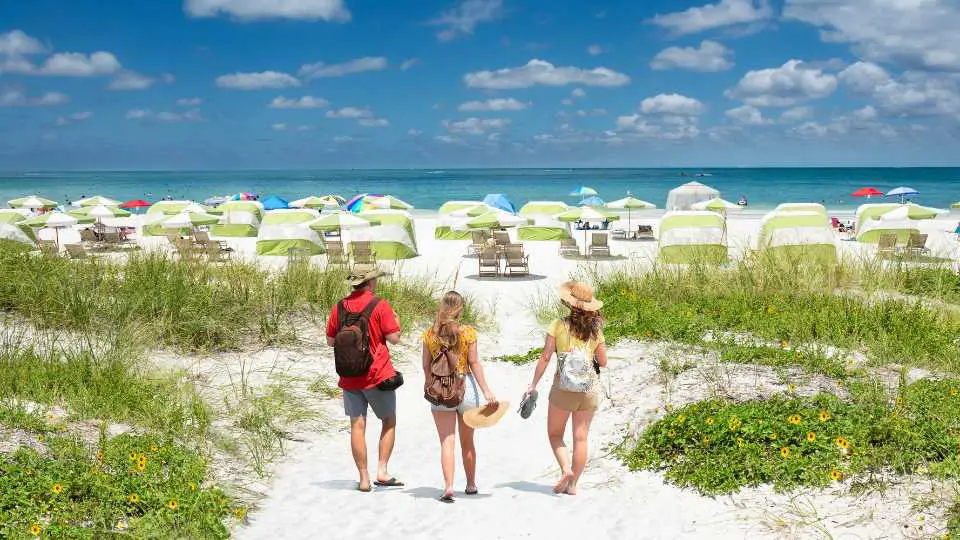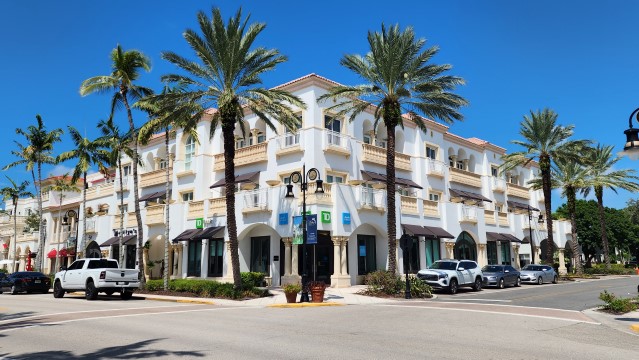
Florida has long been heralded as a haven for retirees, boasting a warm climate, no state income tax, and a variety of lifestyle options catered to the senior population. The state’s demographic statistics underscore its appeal to retirees, with over 20% of its residents aged 65 and above. Among the most celebrated retirement locales in the Sunshine State is The Villages, well-known for its extensive amenities and social opportunities, highlighting the state’s commitment to senior living.
Cost of living and accessibility to healthcare are equally significant considerations for those looking to retire in Florida. Cities like Pensacola offer affordability without compromising on the coastal lifestyle, attracting retirees who seek a balance between budget-friendly living and the allure of the beach.
Beyond financial and health considerations, community connections stand as a key aspect of the retirement experience in Florida, with many areas fostering an environment where social engagement and community participation are readily accessible for the older population.
Why Retire in Florida?
Florida is widely recognized for its warm climate, tax-friendly policies, and dedicated retirement communities. Offering a blend of leisure and practicality, it has become a top retirement destination for many seniors.
Advantages of Florida’s Climate
The Sunshine State promises over 200 days of sunshine per year, providing retirees with ample opportunities to enjoy outdoor activities. Warm weather year-round means less worry about slippery, ice-covered roads or shoveling snow, ensuring a comfortable day-to-day life during retirement.
Tax Benefits for Retirees
No state income tax: This is one of the most attractive financial aspects of retiring in Florida. Retirees can benefit from keeping more of their retirement income, including Social Security benefits, pensions, and IRA or 401(k) distributions.
Diverse Retirement Communities
Retirement communities in Florida are tailored to a variety of lifestyles and budgets. With more than 4.8 million residents aged 65 and above, Florida retirement options range from beachfront properties to serene inland communities, all fostering strong community connections.
Access to Quality Healthcare
Florida invests in its healthcare systems, recognizing the importance for its aging population. Many retirees find access to quality healthcare services including specialist treatments and top-rated hospitals that cater to a wide array of health concerns prevalent in older age.
Choosing Your Florida Home
When considering retirement in Florida, one must carefully evaluate the best locales that correspond with their lifestyle and budget, along with understanding the real estate dynamics and property tax regulations in the state.
Overview of Florida’s Best Places to Retire
In Florida, retirees have a plethora of locations to choose from, each with its unique charm. For beach lovers, Sarasota and Naples offer pristine Gulf of Mexico shores, while Miami and Fort Lauderdale provide vibrant Atlantic Ocean beachfronts. Those seeking a more laid-back community might find The Villages or Port St. Lucie to be ideal with their tranquil settings and abundant recreational activities. Other notable cities that attract retirees due to their amenities and lifestyle options include Tampa, Jacksonville, Orlando, and Pensacola.
Real Estate Market Insights
Florida’s real estate market can vary significantly by region, but generally, housing is known for being more affordable compared to certain other U.S. states. For example, the median home value in Florida as of summer 2023 was $387,537. An analysis of individual markets reveals that areas like Ocala and Pensacola tend to offer more affordable housing options, while Destin and Naples feature properties at a higher price point, reflecting their desirable coastal locations.
Understanding Property Taxes
In Florida, property taxes serve as a significant consideration when purchasing a home. The state offers a homestead exemption to permanent residents, which can provide substantial savings. Property tax rates vary by county and are based on the assessed value of the home. For example, a retiree living in Miami may face different tax implications than one in Fort Myers. It’s crucial for prospective homebuyers to factor in these taxes when budgeting for their new Florida home.

Lifestyle and Recreation
Florida offers retirees an enviable array of outdoor and cultural experiences. From world-class golf courses to pristine beaches and a host of recreational facilities, the state is well-equipped to support a dynamic and fulfilling retirement lifestyle.
Outdoor and Cultural Attractions
Florida’s natural beauty and cultural scene are major draws for retirees. The state boasts numerous state parks and white sand beaches that are perfect for a variety of outdoor activities such as walking, swimming, fishing, and boating. Museums and cultural attractions also abound, offering a wealth of opportunities to engage with art, history, and local heritage. Key destinations include the Salvador Dali Museum in St. Petersburg and the Ringling Museum of Art in Sarasota.
Golf, Beaches, and Theme Parks
The state is known for its extensive selection of golf courses, with options ranging from public courses to exclusive country clubs. Florida’s beaches are often characterized by their soft white sands and are considered among the best in the country for their accessibility and beauty. For those seeking more structured entertainment, Florida’s theme parks, such as Walt Disney World and the Universal Orlando Resort, offer endless recreation and fun.
Weather Considerations
When retiring to Florida, understanding and preparing for the local weather patterns is crucial. Not only does the state’s sunshine appeal to retirees, but it also requires awareness of severe weather such as hurricanes and thunderstorms.
Preparing for Florida’s Weather Patterns
Florida’s climate ranges from tropical to subtropical, resulting in warm temperatures throughout the year. The state experiences high humidity, which can intensify the feel of the heat. Florida is also well-known for its afternoon thunderstorms, especially during the summer months. These storms often produce lightning, which can be a safety hazard. Retirees should familiarize themselves with the typical weather patterns to enjoy the outdoors safely and to maintain their homes properly.
Florida Weather Facts:
- Humidity: High year-round, contributing to heat index.
- Rainfall: Concentrated in summer, frequently in the form of thunderstorms.
- Lightning: Florida has one of the highest rates of lightning strikes in the United States.
Hurricane Safety and Insurance Info
Florida is susceptible to hurricanes, which can occur from June to November during the Atlantic hurricane season. Prospective retirees should consider homes designed to withstand hurricane force winds and be aware of evacuation routes. A wind mitigation inspection can lead to discounts on homeowners insurance.
Insurance Considerations:
- Hurricane damage: Adequate coverage is necessary for wind and flood damage.
- Homeowners insurance: Often has a separate hurricane deductible.
- Wind mitigation inspection: Can reduce insurance premiums if the home has features that reduce the impact of high winds.
Homeowners are advised to review their insurance policies annually to ensure they have appropriate coverage for hurricane damage, including wind and flood insurance. It’s essential to understand the details of one’s policy, as homeowners insurance in Florida can be complex due to the high risk of natural disasters.

Living Costs and Financial Planning
When considering retirement in Florida, individuals must pay close attention to the varying costs of living and the state’s tax system. Accurate financial planning is essential for managing savings and ensuring a comfortable retirement.
Cost of Living in Florida
Florida’s cost of living is an attractive factor for many retirees. The state boasts a median home value that remains competitive relative to the national average. However, retirees should be prepared for expenses that can fluctuate depending on their chosen location within the state. For example, Sarasota and Naples are known for their higher living standards, which may be reflected in prices. Here, housing costs can exceed the state’s median but could also offer retirees a superior lifestyle. In terms of daily expenses, Florida’s sales tax sits at around 6% to 7.5%, depending on the county.
- Median Home Value (as of Summer 2023): $387,537
- Sales Tax: Approximately 6% – 7.5%
Retirees should also consider other costs such as utilities, healthcare, groceries, and transportation, which contribute to the overall cost of living.
Navigating Taxes and Insurance Costs
Florida stands out for its tax benefits to seniors. It does not impose a state income tax, which includes income from Social Security benefits, pensions, IRAs, and other retirement plans. This absence of state income tax can provide a significant saving for retirees.
- State Income Tax: $0 on retirement income
However, retirees must budget for property taxes, which vary by location but are generally considered reasonable compared to other states. Another financial consideration is the cost of property insurance; Florida can have higher premiums due to the risk of natural disasters. Retirees should consult with a financial advisor to assess the impact of these costs on their retirement savings.
- Property Taxes: Varies by location
- Property Insurance: Higher than average due to environmental risks
It is noteworthy that Florida does not levy an estate tax or an inheritance tax, which can result in significant savings for heirs. When planning for the future, seniors should consider how the absence of these taxes may affect their inheritance plans.
Retirees should evaluate their potential exposure to these costs and perhaps seek the advice of a financial advisor to navigate the specifics of insurance and tax savings, which could include working with the Citizens Property Insurance Corporation for more affordable coverage options. Proper financial planning will not only address current expenses but also facilitate a strategy for future wealth management.
Healthcare Services
Florida offers retirees a strong network of healthcare facilities catering to their medical needs, ensuring access to high-quality care in proximity to senior living communities.
Hospitals and Medical Centers
- Sarasota Memorial Hospital: It stands as one of the largest public health systems in Florida, offering comprehensive medical services.
- Mayo Clinic: Known for its exemplary care and research, the Jacksonville branch of Mayo Clinic provides specialized treatments across various medical fields.
- Cleveland Clinic: With a location in Weston, Cleveland Clinic is recognized for its innovative approach and expertise in complex medical cases.
Senior-Focused Health Facilities
In Florida, retirees benefit from an array of senior-focused health facilities, including:
- Continuing Care Retirement Communities (CCRCs): These offer a range of services from independent living to skilled nursing care, often in one location to accommodate changing health needs.
- Specialized Programs: Many institutions host programs targeting senior care, providing both preventive and acute treatment options tailored to the older population.
Florida’s Cultural and Entertainment Scene
Florida’s retirement appeal extends beyond its warm climate and tax benefits; its cultural and entertainment offerings are rich and diverse, providing a stimulating retirement lifestyle.
Arts, Theater, and Music
The state boasts an abundance of art exhibitions, theater performances, and music events. Opera aficionados can visit prestigious venues like the Adrienne Arsht Center in Miami, offering a range of performances from classical to modern interpretations.
Theaters are scattered across the state, with highlights including:
- The Straz Center in Tampa offering Broadway shows.
- The Hippodrome State Theatre in Gainesville providing unique theatrical experiences.
For those who appreciate visual arts:
- The Dalí Museum in St. Petersburg showcases an extensive collection of Salvador Dalí’s works.
- Numerous local art galleries reflect Florida’s diverse cultural heritage.
Year-Round Events and Festivals
Florida’s calendar is replete with a variety of events and festivals throughout the year, catering to a wide range of interests. The Miami International Film Festival is a must-attend for cinema enthusiasts, while Winter Park’s Sidewalk Art Festival celebrates the visual arts with national acclaim.
Key events include:
- Miami International Film Festival: a gathering of cinema artists and aficionados.
- Winter Park Sidewalk Art Festival: one of the nation’s largest and most prestigious outdoor art festivals.
These events not only highlight cultural attractions but also allow residents to engage with Florida’s natural beauty, as many festivals take place in picturesque outdoor settings.
Exploring Beyond the Mainland
For retirees seeking scenic beauty and a slower pace of life, Florida’s less-traveled regions offer a unique charm. These areas provide a blend of serene island living and the rustic appeal of the coast.
Florida Keys and Island Living
The Florida Keys, stretching beyond the southern coast of Florida, present an alluring option for retirees who dream of island life. Known for their laid-back atmosphere and natural beauty, the Keys consist of numerous islands, each offering its own character.
- Key West: Famed for its historic architecture and vibrant cultural scene.
- Islamorada: Renowned for sport fishing and coral reefs, ideal for diving and snorkeling.
Retirees appreciate the mix of leisure activities, from sailing to exploring local art galleries. The climate is typically warm, with a gentle ocean breeze mitigating the subtropical heat.
Discovering the Florida Panhandle
The Panhandle, representing a quieter segment of the Gulf Coast, boasts some of the most pristine white sand beaches, such as those found in Destin and Pensacola. The region is known for:
- Navarre Beach: Pristine beauty with clear waters.
- Santa Rosa Beach: A scenic spot with artist colonies and boutiques.
It’s not just the beaches that attract; the area’s small-town feel and Southern hospitality provide a stark contrast to Florida’s bustling metropolitan regions. In addition, the cost of living is generally more affordable, making it a practical choice for many retirees.

Comparing Florida to Other States
When considering retirement, many evaluate Florida against other popular destinations by examining factors such as taxes, climate, and cost of living.
How Florida Stacks Up Against Other Retirement Spots
Florida is often compared to states like North Carolina, Arizona, and Texas for retirement. Each state offers its unique advantages, and sources such as SmartAsset and U.S. News & World Report offer data to help retirees make an informed decision.
- Taxes: Florida stands out as having no state income tax, which includes no taxes on Social Security benefits, pensions, or 401(k) withdrawals. In contrast, North Carolina does impose state taxes on various forms of retirement income. Arizona has lower income tax rates but does tax Social Security to some extent. Texas, like Florida, does not have state income tax, making it another tax-friendly state for retirees.
-
Climate: Florida’s climate is evidently warm with a year-round subtropical to tropical climate that is often cited as a major draw for retirees seeking to avoid cold winters. Arizona also offers a warm climate, but it’s arid with desert temperatures that can be extreme. North Carolina provides a variety of climates, from the moderate coastal regions to the more seasonal mountain areas.
-
Cost of Living: Reports by organizations like U.S. News & World Report often take into account the cost of living, which is a critical factor for retirees. Florida’s cost of living can vary but is generally reasonable; however, some areas, particularly in the south and coastal regions, can be expensive. Both Arizona and North Carolina offer pockets of affordability, although popular retirement communities can come with a higher price tag. Texas boasts a diverse range of living costs, but overall, it provides many affordable options for retirees.
Evaluating Florida in the context of other states offers a perspective on why it’s a top contender for retirees, with its favorable tax policies, agreeable climate, and varied living costs.
Retirement Logistics
Retirement planning in Florida requires a thorough approach to ensure that financial and lifestyle goals align. This section covers the importance of defining retirement objectives and the role of professional guidance in achieving a successful retirement.
Setting Up Your Retirement Goals
One’s retirement age is a significant factor in logistics planning. It’s critical to calculate the expected retirement savings needed to maintain one’s lifestyle in Florida. One should consider the cost of living, healthcare, and the types of activities they aspire to engage in during retirement. Many often aim for a robust retirement plan which may include 401(k)s, IRAs, and possible pension funds.
Working with Retirement Experts
Seeking assistance from retirement experts can provide valuable insights into the complexities of retirement planning. A financial advisor can offer tailored advice to help manage retirement savings effectively, and ensure that investments align with one’s risk tolerance and time horizon. Their expertise often plays a crucial role in maximizing returns on 401(k)s and advising on the distribution phase of retirement plans.
Leisure and Sport in Florida
Florida’s retirement communities often boast a wealth of leisure and sporting activities specifically catering to active seniors. With an emphasis on outdoor living, retirees find Florida’s year-round warm weather ideal for engaging in golfing and a variety of water sports.
The Golfing Scene
Florida is renowned for its extensive selection of golf courses, attracting both amateur and professional players. The Villages, one of Florida’s top retirement destinations, offers an impressive array of golfing facilities with courses designed to suit all skill levels.
Golfing enthusiasts have access to some of the nation’s most prestigious courses, such as:
- TPC Sawgrass: Home of the iconic 17th-hole island green
- Seminole Golf Club: A top-ranked course with Atlantic Ocean breezes
Florida’s mild climate allows golfers the luxury of playing year-round, making it a pivotal part of the state’s leisure culture.
Water Sports and Coastal Life
The Gulf of Mexico and the Atlantic Ocean border Florida, providing retirees with endless opportunities for water recreation. Residents can explore a variety of water sports and activities:
- Sailing and Boating: With numerous marinas and sailing clubs, retirees can take to the seas or bask in the calm Gulf waters.
- Fishing: Both coasts offer rich fishing locales, from deep-sea adventures to serene fly-fishing spots.
- Beach Activities: Sandy shores invite leisurely walks, beach volleyball, and sunset gatherings.
The proximity to water not only enhances Florida’s appeal but directly influences the daily activities and lifestyle of its retirement community members, promoting a vibrant coastal living experience.

Downsizing and Estate Planning
Moving to Florida for retirement requires careful consideration of how to simplify living arrangements through downsizing and safeguarding one’s assets and wishes through comprehensive estate planning.
Downsizing for Retirement
Downsizing during retirement often involves reducing one’s living space and possessions to better match the current life stage. In Florida, retirees can benefit financially and emotionally from downsizing. When transitioning to a smaller home, retirees can potentially reduce living expenses and increase cash reserves by selling a larger property. This process involves:
- Identifying must-have items and letting go of unnecessary possessions
- Considering the practicality of the new living space
- Calculating the cost savings of a smaller home
By focusing on these aspects, retirees can create a comfortable, stress-free living environment conducive to their new lifestyle.
Estate Planning Essentials
Estate planning is critical for retirees, especially when moving to a new state like Florida with unique laws. It involves organizing one’s assets to ensure that their wishes are followed upon their passing. Key components include:
- Drafting a will: A legal document stating the individual’s wishes for asset distribution
- Establishing trusts: These can help manage assets and may potentially reduce estate taxes
- Healthcare directives: Outlining preferences for medical care
Florida retirees should be mindful that the state does not impose an estate or inheritance tax; however, federal estate tax considerations remain pertinent. Proper estate planning also provides clarity for inheritors and can prevent potential legal complications.
Retirement Community Profiles
Florida offers an array of retirement communities, each varying in services and lifestyle choices. This section focuses on the profiles of these communities, diving into specifics about popular destinations and the range of amenities offered to residents.
Spotlight on Popular Retirement Destinations
- The Villages: Known for its expansive network of amenities and active social scene, The Villages remains a top choice for retirees. It sits just an hour north of Orlando and boasts a well-established, tight-knit community.
- Ocala: Offering a more relaxed pace, Ocala is known for its equestrian culture and natural beauty. Its affordability appeals to retirees seeking a tranquil haven amidst Florida’s landscapes.
- Sarasota: Balancing cultural vibrancy with beachside serenity, Sarasota attracts retirees with its art scene, dining, and white sandy beaches.
- Tallahassee: The state capital’s appeal to retirees lies in its blend of cultural offerings, educational opportunities, and a canopy of oak-lined streets.
Community Services and Amenities
Within these retirement communities, residents typically find a wide selection of services and amenities designed to cater to their needs and interests:
- Health Care: Most communities have on-site healthcare facilities or are situated close to top medical centers.
- Recreation and Entertainment: From golf courses to craft clubs and fitness centers, the focus on active living is paramount.
- Security: Gated entries and security personnel are common features that offer residents peace of mind.
- Transportation: Communities like The Villages provide comprehensive internal transportation networks, making mobility easy and convenient for those who prefer not to drive.
Adventure and Travel in Retirement
Retirement in Florida offers an abundance of opportunities for travel and the pursuit of new hobbies. From exploring diverse locations across the state to engaging in activities that foster new interests, retirees can enjoy a dynamic lifestyle.
Traveling Across Florida
Florida’s extensive array of destinations caters to retirees who thrive on exploration. The Florida Panhandle, with its laid-back beach towns and natural preserves, is perfect for those seeking serenity amidst nature. In contrast, the Florida Keys offer a tropical getaway with activities like snorkeling and fishing. For ease of travel planning, retirees may consider:
- Joining senior travel groups
- Visiting tourist information centers for local insights
- Taking advantage of Florida’s well-connected highways for road trips
Popular destinations in Florida include:
- St. Augustine: Historical tours and art galleries
- Naples: High-end shopping and golf courses
- Sarasota: Cultural festivals and live theater
Finding New Hobbies and Interests
Retirement is the ideal time for individuals to explore new hobbies or dive deeper into existing passions. With Florida’s rich offerings, one can easily find activities that align with their interests. For instance:
- Art and Culture: Many retirees take up painting or photography to capture Florida’s landscapes.
- Outdoor Activities: Kayaking, bird-watching, and hiking are popular among those who enjoy the outdoors.
- Learning Opportunities: Community colleges often offer classes tailored to retirees.
To facilitate these interests, retirees can:
- Enroll in local workshops or courses
- Join clubs or societies that focus on specific hobbies
- Attend community events and exhibitions
Whether it’s traversing the many scenic routes of Florida by road or investing time in leisure activities, retirees have ample choices to make their golden years adventurous and fulfilling.

Further Education for Seniors
Florida offers extensive educational initiatives for seniors, recognizing the value in promoting cognitive well-being through lifelong learning. These programs often present affordable, enriching experiences tailored for older adults.
Opportunities for Lifelong Learning
Lifelong learning in Florida encompasses a range of activities designed to engage seniors in continuous educational pursuits. These can include:
- Community Workshops: Local community centers and libraries frequently host workshops on topics ranging from technology to art.
- Online Courses: Seniors can access a variety of courses online, enabling them to learn from the comfort of their homes.
- Discussion Groups: Book clubs and discussion forums encourage social interaction along with mental stimulation.
Participation in these programs is linked to improved cognitive function and can contribute significantly to a senior’s quality of life.
University Programs and Workshops
Many universities in Florida offer senior-specific educational opportunities:
- Senior Citizen Tuition Waiver: This program allows seniors to audit university courses for free or at a significantly reduced cost.
- Lifelong Learning Institutes: Several institutions have dedicated programs where seniors can take non-credit courses alongside their peers.
- University-Led Workshops: Universities often host workshops on topics relevant to seniors’ interests and needs.
These university-affiliated programs give seniors access to high-quality education, fostering a stimulating environment for personal growth and learning.
Aging and Accessibility
Florida offers an inviting climate for retirees who prioritize aging in comfort and with ease of access to the services they need.
Aging in Place
A significant portion of Florida’s population is aged 60 or over, creating a demand for aging-friendly resources and homes. Aging in place is viable in Florida thanks to a robust network of Aging and Disability Resource Centers (ADRCs). These centers guide seniors on long-term care resources, helping them maintain their independence and quality of life.
- ADRCs provide:
- Information and support services
- Links to healthcare resources
- Assistance in navigating long-term care options
Accessibility and Mobility Solutions
For those concerned with mobility, Florida’s infrastructure and community planning take into account the ease of transport and accessibility.
- Mobility solutions include:
- In-home modifications: Ramps, grab bars, and widened doorways
- Transport options: Community shuttle services and paratransit
- Community design: Walkable neighborhoods and accessible public spaces
Florida’s commitment to accessible senior living communities and personalized mobility solutions supports individuals’ needs to live a fulfilling and self-sufficient lifestyle.
Final Considerations
Before making the leap to retire in Florida, one should weigh all factors carefully. This section will help you summarize the advantages and challenges of retiring in Florida and guide you through the necessary steps to make your retirement a reality.
Summing Up the Pros and Cons
Pros:
- No State Income Tax: Individuals can benefit from no tax on wages or retirement income, which includes Social Security benefits, pensions, and retirement accounts.
- Climate: Florida’s warm weather is ideal for year-round outdoor activities.
- Senior Population: With a significant percentage of residents over 65, retirees have the opportunity to engage in a community with similarly aged individuals.
Cons:
- Climate: While the weather is typically warm, Florida is also prone to hurricanes and extreme heat.
- Cost of Living: Some areas in Florida have a high cost of living, particularly popular retirement destinations.
Taking the Next Steps
- Research: Investigate the best places in Florida that fit your budget and lifestyle.
- Visit: Spend some time in potential retirement spots at different times of the year.
- Healthcare: Ensure that there are adequate healthcare facilities nearby.
- Legal Considerations: Consult with a financial advisor or legal expert to understand the implications of Florida’s tax policies and estate laws on your retirement plan.

Retirement Realities
Retirement in Florida offers a blend of expectations and the day-to-day realities of living in the Sunshine State. Accurate anticipation and planning can shape a fulfilling retirement life.
Expectation Vs. Reality
Expectation: Florida is often envisioned as an affordable paradise with endless leisure and low living costs.
Reality: While Florida boasts no state income tax, the cost of living, particularly in prime locations, can be high. As shown in search snippets, Pensacola’s median monthly rent is approximately $1,100, and median home prices in Palm Bay round up to $200,000. Retirees should explore various cities, as costs can vary significantly from The Villages, a popular retirement community, to coastal cities like Pensacola.
Adjusting to Retirement Life
Emotional and Social Adjustment:
- New Routine: Shifting from a structured work life to freedom in retirement may require time to adapt.
- Social Networks: Developing a social circle post-retirement can be challenging. In areas like The Villages, social engagement is encouraged.
Health and Well-being:
- Activity Levels: The active lifestyle in retirement communities can positively impact health. Florida offers outdoor activities such as golfing, beach strolls, and bird-watching in Sebastian known for its wildlife variety.
- Access to Healthcare: Necessary consideration should be given to healthcare facilities’ proximity, especially since the proportion of residents aged 65 and above can reach 34.5% in places like Sebastian.
Support Networks and Services
When retiring in Florida, individuals have the advantage of tapping into robust support networks and diverse local services that can make the transition to retirement life smoother and more enjoyable.
Building a Support Network
Community Groups: In Florida, retirees can join numerous community groups and organizations that cater to the 65 and older demographic, which makes up nearly 22 percent of the state’s population.
- Social Clubs: Many Florida communities offer social clubs tailored to a variety of interests, fostering connections among residents.
- Activity Centers: Senior-oriented activity centers provide opportunities for retirees to engage in events, classes, and workshops, encouraging social interaction and lifelong learning.
Volunteer Opportunities: Engaging in volunteer work is a great way for retirees to build a support network while giving back to the community. Florida hosts a wealth of charitable organizations in need of volunteers.
Utilizing Local Services
Healthcare Facilities: Florida’s healthcare network is well-equipped to serve its large senior population, with access to top-rated hospitals and specialized elderly care facilities.
- Preventative Care Services: Preventive care and wellness programs are widely available, and many are designed specifically with seniors in mind.
Transportation Services: For those who no longer drive, there are various transportation services available:
- Public Transportation: Reduced fares for seniors on buses and trains.
- Shuttle Services: Many communities offer shuttle services for seniors to assist with grocery shopping, medical appointments, and other errands.
Information & Assistance: Florida provides informational resources and assistance services to help seniors navigate retirement living:
- Resource Centers: Local senior resource centers can offer guidance on benefits, health care options, and community services.
Retirees in Florida can find a welcoming and supportive environment with ample resources to maintain a social and active lifestyle, backed by quality services that cater to their needs.
Sports and Fitness
Florida retirees find abundant opportunities to stay fit and engage in a variety of sports. With year-round warm weather and a myriad of facilities catering to older adults, maintaining an active lifestyle is both convenient and enjoyable.
Staying Active in Retirement
For those settling in Florida, staying active is made simple by the state’s extensive range of fitness classes tailored to senior needs. From Zumba to Tai Chi, options are plentiful and cater to all fitness levels. Many communities offer free or low-cost classes, encouraging regular participation. In addition, Florida’s flat terrain and scenic views provide the perfect setting for walking, jogging, or biking.
Joining Sports Clubs and Leagues
Retirees with an interest in more structured activities can join various sports clubs and leagues. Florida’s sports clubs offer a chance for retirees to socialize and compete in sports such as golf, tennis, and pickleball — a local favorite.
Arts and Social Scene
Florida’s retirement communities provide a vibrant arts and social scene catering to diverse interests and facilitating active engagement among residents.
Engaging in the Arts Community
In Florida, retirees have ample opportunities to immerse themselves in the arts, whether through visiting galleries, attending workshops, or participating in cultural events. Many cities, such as Saint Petersburg, boast a rich history of arts that continues to thrive, with galleries and museums offering senior-focused programs. The Villages, for example, provides a schedule of art classes and exhibitions tailored for its residents.
Social Groups and Gatherings
The state’s social scene is highly active, with a variety of social groups designed for retirees to connect and enjoy shared interests. Florida’s larger cities like Tampa and its neighborhoods often host gatherings ranging from book clubs to dance classes. Community centers in these areas organize events specifically for the over 65 demographic, creating a network of social interaction and support.

Technology and Innovation
When retiring in Florida, one can expect to find that the intersection of technology and innovation plays a significant role in enhancing the experience of retirees. These advancements create more engaging, comfortable, and connected lifestyles for those in their retirement years.
Embracing Technology in Retirement
Retirees in Florida have the opportunity to integrate various technologies into their daily lives, which can greatly aid in health monitoring and maintaining social connections. Smart devices such as tablets and smartphones have become essential tools, allowing older adults to video chat with family, access telehealth services, and manage smart home systems that provide enhanced safety and convenience.
Popular Technologies for Florida Retirees:
- Smartphones and Tablets: For communication and entertainment.
- Wearable Health Devices: To monitor vital signs and activity levels.
- Home Automation Systems: For security and energy management.
Embracing these technologies allows for a retirement that is not only safer and more convenient but also more connected to the broader community and loved ones.
Innovations in Senior Living
Florida’s senior living communities are at the forefront of leveraging innovations to improve the quality of life for residents. These communities often incorporate cutting-edge advancements to offer better health care, security, and lifestyle amenities.
Highlights of Innovative Senior Living:
- Health Care: Advanced medical alert systems and in-home health monitoring.
- Security: High-tech surveillance systems and personal emergency response systems.
- Community Amenities: Virtual reality experiences and digital social platforms.
Retirement communities in Florida strive to implement the latest innovations, creating environments where retirees can enjoy a blend of modern convenience and the comforts of home.
Retirement and Law
When retiring in Florida, one should be aware of the legal landscape that will affect their retirement years. This includes understanding the specific laws regarding estates and inheritances, which may impact one’s financial planning and legacy.
Legal Considerations for Retirees
Retirees in Florida should familiarize themselves with state-specific legalities that can impact various aspects of their retirement. This includes laws governing senior rights, property, and healthcare directives.
- Senior Rights: Florida laws provide protections aimed at safeguarding seniors from fraud and abuse.
- Property: Florida’s Homestead Exemption Law is beneficial for homeowners, potentially providing property tax benefits and protection against forced sale by creditors.
- Healthcare Directives: Retirees should create legal documents like a Living Will and Healthcare Surrogate, empowering others to make medical decisions should they become incapable of doing so.
Estate and Inheritance Laws
The state of Florida has distinct laws regarding estate and inheritance which can influence how an individual’s assets are allocated upon their passing.
- Estate Laws: Florida does not have a state estate tax, but federal estate tax may still apply to substantial estates.
- Inheritance Laws: Florida has no inheritance tax, and the distribution of assets is guided by a will. In the absence of a will, Florida’s intestate succession laws determine the inheritance structure.
| Aspect | Consideration in Florida |
|---|---|
| State Estate Tax | None |
| Inheritance Tax | None |
| Intestate Succession | Follows state laws |
| Homestead Exemption for Property | Available to residents |
| Protection Against Elderly Abuse | Laws in place |
Retirees should engage with a knowledgeable attorney to ensure that their estate planning adheres to Florida state laws and to secure their assets for future beneficiaries.

Managing Healthcare Costs
When planning for retirement in Florida, an individual must navigate the complexities of healthcare costs which can be substantial. It’s crucial to establish a robust strategy for budgeting and choosing the right health insurance options to ensure financial stability throughout retirement years.
Budgeting for Healthcare
Healthcare expenses in retirement often exceed expectations, as costs continue to rise. Retirees should anticipate these expenses to be a significant component of their budget. A standard approach is to allocate 15% of retirement income for healthcare expenditures. If projected healthcare costs surpass this percentage, consulting with a financial advisor can help adjust retirement savings plans. One must also consider the future increase in healthcare costs, which historically have escalated faster than the rate of inflation.
Health Insurance Options
Selecting the right health insurance options is essential to manage healthcare costs effectively. Medicare is commonly the primary insurance for retirees, but Medicare alone may not cover all expenses. Understanding the gaps in Medicare is important:
- Part A (Hospital Insurance): Covers inpatient hospital stays, care in a skilled nursing facility, hospice care, and some home health care.
- Part B (Medical Insurance): Covers certain doctors’ services, outpatient care, medical supplies, and preventive services.
- Part C (Medicare Advantage Plans): An alternative to Original Medicare that bundles Part A, Part B, and usually Part D.
- Part D (prescription drug coverage): Helps cover the cost of prescription drugs.
In addition to Medicare, beneficiaries may consider Medigap supplemental insurance to help cover copayments, coinsurance, and deductibles. Private insurance options like Health Maintenance Organizations (HMOs) or Preferred Provider Organizations (PPOs) can also be suitable, depending on individual needs and budget constraints. It is vital to compare plans during the open enrollment periods to find a balance between coverage and out-of-pocket costs.
Planning for the Unexpected
Planning for retirement in Florida involves more than financial security and finding the perfect sunny spot; it also requires foresight to handle unexpected situations and emergencies effectively.
Emergency Preparedness
In the context of emergency preparedness, retirees should consider Florida’s susceptibility to natural events such as hurricanes. Adequate insurance is crucial, including flood insurance, which is not typically covered in standard homeowner’s policies. A well-thought-out emergency plan should encompass:
- Evacuation routes: Familiarize oneself with local evacuation procedures and routes.
- Emergency kits: Maintain a kit with essentials like water, food, medication, and important documents.
Unexpected Events
Life’s unpredictability calls for a comprehensive approach to unexpected events. Retirees should ensure they have:
- Healthcare directives: Legally document healthcare preferences in anticipation of a situation where one cannot make decisions.
- Power of Attorney (POA): Assign a trusted individual to manage affairs if one is incapacitated.
- A robust savings plan: To cover unexpected expenses outside of regular living and medical costs.
Networking and Community Building
Upon retiring in Florida, individuals have the opportunity to forge new relationships and actively participate in community life. This can lead to a fulfilling retirement through both social networks and community contribution.
Retiree Networks and Relationships
Retiree networks in Florida are robust, often centered around shared interests or experiences. 55+ communities frequently offer social events, clubs, and gatherings that foster interpersonal connections among residents. For example:
- Clubs and Interest Groups: Golf, tennis, art, and book clubs
- Social Gatherings: Weekly dinners, dances, and cultural outings
Potential retirees should inquire about community calendars and social clubs when considering different 55+ communities to ensure they can easily build relationships upon relocation.
Community Engagement and Volunteering
Community engagement is a cornerstone of Florida’s retiree communities. Volunteering serves as a prime avenue for retirees to contribute meaningfully to local causes and connect with others. Vital opportunities include:
- Local Nonprofit Organizations: These can range from environmental conservation groups to tutor programs in local schools.
- Event Volunteering: Supporting community events such as food drives, holiday celebrations, and charity runs.
Most communities provide a list of volunteering opportunities, promoting not only a chance to give back but also to stay active and engaged within the society. Retirees often find that volunteering enriches their lives, offering both purpose and companionship.

Transitioning to Retirement
Retirees face significant changes as they shift from a working lifestyle to retirement. A well-considered approach can make the transition seamless, allowing retirees to adapt to new routines gracefully.
Strategies for a Smooth Transition
Financial Planning: A fundamental strategy involves firming up your financial foundation. Retirees should ensure they have a robust financial plan that accommodates potential long-term needs and adjusts for the cost of living in Florida, which can be influenced by the state’s popularity among retirees.
- Assess retirement savings
- Budget for Florida’s cost of living
- Consider tax implications
Social Connections: Establishing a strong social network is crucial. Those moving to Florida can benefit from joining community groups or partaking in local activities, fostering connections that are vital for emotional well-being.
- Participate in local community events
- Join clubs or groups aligned with personal interests
Housing Considerations: Choosing the right housing option is key. Options range from active adult communities to waterfront properties, each offering unique benefits.
- Research housing communities
- Evaluate amenities and proximity to health care services
Adapting to a New Routine
Healthcare Access: Regular healthcare is paramount for retirees. Reviewing healthcare facilities and understanding the insurance landscape in Florida can ensure they receive continual care.
- Explore local healthcare providers and services
- Understand Medicare and supplemental insurance options in Florida
Lifestyle Changes: Managing free time effectively can lead to a fulfilling retirement. Retirees should explore hobbies and activities that keep them engaged and promote an active lifestyle.
- Identify personally enriching activities
- Incorporate regular physical exercise into the weekly routine
Time Management: With the absence of a work schedule, retirees must find new ways to structure their days. Developing a routine that includes social activities, exercise, and personal time can lead to a balanced lifestyle.
- Set a consistent daily routine
- Balance leisure with productive activities
Entertainment and Leisure
Florida provides a dynamic range of entertainment and leisure options tailored to suit the lifestyles of retirees. Whether one seeks cultural events or outdoor activities, the state caters to diverse interests and preferences.
Entertainment Options for Retirees
Retirees in Florida can enjoy a vibrant assortment of entertainment venues including theaters, concert halls, and art galleries. Tampa, known for its bustling arts scene, plays host to numerous cultural festivities throughout the year. Seniors can partake in engaging experiences such as:
- Broadway shows at the Straz Center for the Performing Arts
- Orchestral performances by the Florida Orchestra
- Exhibitions at the Tampa Museum of Art
Florida’s rich cultural tapestry ensures that seniors have access to various events that resonate with their preferences.
Leisure Activities
For those who prefer leisure time filled with physical activity or relaxation, Florida offers a plethora of outdoor and recreational activities. Golf enthusiasts can explore numerous courses, while beaches provide a serene backdrop for relaxation or water sports. Key leisure activities include:
- Golfing at renowned clubs like those in Palm Beach County
- Beach outings along the Gulf Coast and South Florida shores
- Community-based activities in retirement-centric locales like The Villages
Florida’s favorable climate allows retirees to engage in these activities year-round, facilitating an active and fulfilling lifestyle.
Volunteering and Giving Back
Retirement in Florida offers ample opportunities for seniors to engage in meaningful volunteer work and philanthropy, enriching their lives and the community.
Community Service Options
Seniors in Florida have a diverse array of community service opportunities. They can contribute their time and skills to health care programs, participate in environmental conservation projects, or support the arts. Educational programs often seek retirees to tutor and mentor students, tapping into a lifetime of knowledge. Organizations like the United Way of West Florida’s Retired and Senior Volunteer Program (RSVP) cater specifically to older volunteers, offering personalized placements that make the most of seniors’ availability and skills.
- Healthcare: Volunteers can assist in local clinics and hospitals.
- Environmental: Tasks include beach clean-ups or supporting local parks.
- Education: Opportunities range from tutoring to assisting in libraries.
Philanthropy in Retirement
Retirees may choose to engage in philanthropy by donating to local charities or even by serving on non-profit boards. Their contributions can have significant impacts on community resources and services. The act of giving in Florida doesn’t only have to be monetary; it can also be the donation of time, expertise, or even the leadership retirees can offer.
- Monetary Donations: Select causes that resonate personally.
- Expertise: Offer skills to non-profits, such as legal, financial, or business advice.
- Leadership: Guide organizations by serving on a board or committee.

Are you interested in owning a home in Florida?
If the allure of sun-kissed beaches, vibrant communities, and year-round warmth speaks to your heart, owning a home in Florida might just be your next great adventure!
To assist our audience with buying or selling a vacation property, Endless Summer has affiliated with Quantum Realty Advisors, Inc. (“Quantum”) which is a licensed Florida real estate company that has been in business since 1998. Whether you’re dreaming of a cozy beachfront bungalow, a sprawling estate nestled against the backdrop of palm trees, or a chic urban condo in the heart of a bustling city, Quantum will help make that dream a reality.
From less than $500,000 to more than $5 million, the Quantum team will be happy to assist with your vacation home buying process and can be reached at 561.584.8555.
Quantum Realty Advisors, Inc.
4440 PGA Boulevard, Suite 308 | Palm Beach Gardens, FL 33410
561.584.8555

Quantum’s experienced real estate advisors will take the time to discuss exactly what your are looking for in a vacation home as well your what will fit into you budget. And when you are ready to begin, they will be with you every step of the way. Click here to learn more about Quantum.

